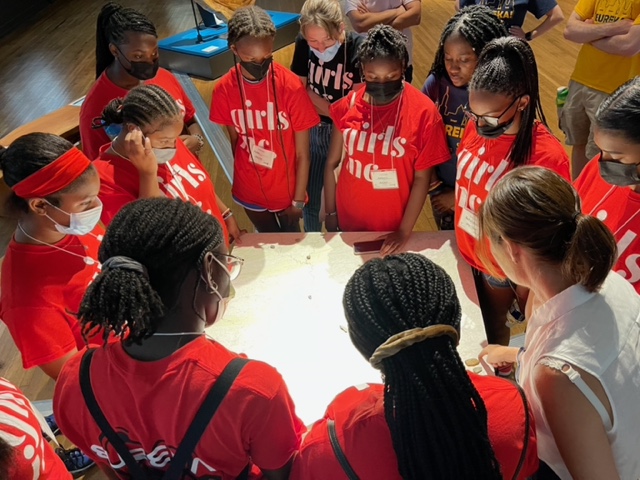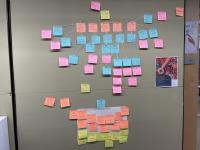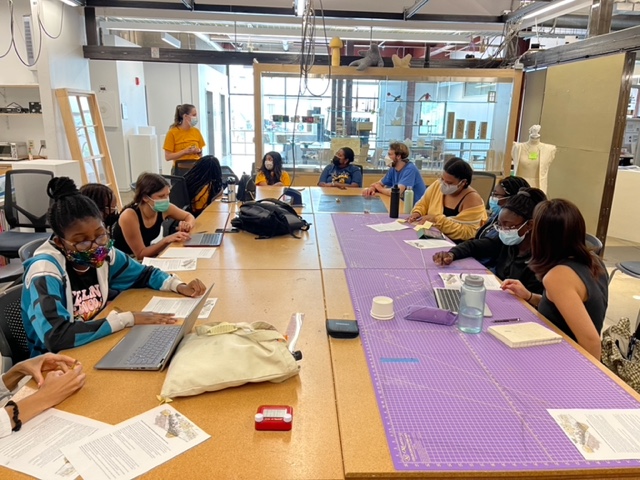EUREKA!: Building Sustainable Citizenship through Design Thinking and STEM
A new partnership between Drexel Westphal and Engineering, funded by the Academy of Natural Sciences, fueled an inspiring summer for girls studying STEM.
 EUREKA! campers approach the challenge to create a bioswale prototype.
EUREKA! campers approach the challenge to create a bioswale prototype.
November 10, 2022
What are the qualities of sustainable citizenship? How can STEM leaders encourage these qualities in a rising generation? How can design thinking unlock the qualities of sustainable citizens? These questions, and more, drive recent programming from EUREKA! a partnership between Drexel and Girls Inc. of Greater Philadelphia and Southern New Jersey.
The EUREKA! program is an intensive five-year program for rising 8th grade girls that builds their confidence and skills through hands-on opportunities in science, technology, engineering, and math (STEM). Offered all over the country, the Drexel chapter of EUREKA! was founded by professor Simi Hoque of the College of Engineering; Alissa Sperling is the STEM Curriculum Director, and Kim Spina Smith, Assistant Director of Outreach and Development for the Department of Civil, Architectural, and Environmental Engineering, manages the camp logistics, including publicity, social media, and photography. In their first two years of the program, participants come to Drexel for a STEM summer camp, which includes hands-on skill-building activities and workshops with faculty.
In 2021, Drexel’s EUREKA! program received a grant from the National Science Foundation to study the building of sustainable citizenship. Sustainable citizens embody green values, engage with their communities with an eye toward activism, and develop proactive sustainable habits. Sperling and Hoque designed the curriculum to encourage and report on the development of these sustainable habits, their metrics including everything from attitudes toward recycling, tendency toward activism, STEM attitudes, and feelings of self-efficacy.
Then in 2022, Hoque and Sperling received a Museum Innovation Fund (MIF) grant from the Academy of Natural Sciences (ANS) to support a student-designed green water infrastructure demonstration. MIF seed grants provide funding to Drexel faculty and students for projects that promote conception and rapid prototyping of innovative approaches to museum learning and engagement. The rising 9th grade EUREKA! students had already completed a summer of sustainability-focused curriculum, and with the support of the MIF grant, they would now put that learning to the test with a practical experiment.
In the same round of MIF funding, Product Design associate professor Michael Glaser also received a grant to explore design thinking in the creation of an Academy pop-up experience. Glaser’s proposal intended to engage students from both Drexel and local high schools.
Design thinking is a collective term that describes the iterative, strategic processes used by designers to solve complex problems and produce innovative solutions. The Product Design major in the Antoinette Westphal College of Media Arts & Design operates around a design thinking approach, encouraging students to become creative problem-solvers, innovators, and entrepreneurs.
Seeing the complementary aspects of the two MIF proposals, the Academy of Natural Sciences approached the Westphal and Engineering teams about working together. Glaser’s team would collaborate with second-year STEM campers from EUREKA! toward the creation of a prototype for museum learning, centered around the sustainability curriculum and the Academy’s Water Year.
“Getting matched with Mike was the best thing that ever happened to us,” says Sperling.
Sperling and Glaser challenged more than a dozen EUREKA! Campers, with the support of nearly 20 sophomore PROD students, to develop an interactive display for ANS, framing the charge around a bioswale. Bioswales, artificial drainage channels that concentrate and convey stormwater runoff, are oft-overlooked heroes in cities. As a structure for the EUREKA! curriculum collaboration, the bioswale served as a fascinating case study for the development of both urban sustainable citizenship and design thinking habits.
In July, the campers visited the Product Design studios in Westphal’s URBN Center and worked side by side with Drexel sophomores to tackle the challenge. The Product Design studios themselves are a testament to design thinking; it’s a collaborative, exploratory space for students and faculty to ideate and test. There are sketches and storyboards pinned to every wall, models and blueprints across every table. On a given day, students can be found tinkering at their individual workspaces, pitching ideas in front of their peers, or fabricating prototypes in one of the making labs.
 One wall, for example, in the Product Design facility sports a cluster of post-Its, strung together like a spiderweb, that initiates with the question, “How do we get people to cook more?” From that central question springs a wealth of further questions, which address social, environmental, economic, and access challenges. Design thinking hinges on the holistic consideration of such factors, and of the myriad stakeholders in any inquiry.
One wall, for example, in the Product Design facility sports a cluster of post-Its, strung together like a spiderweb, that initiates with the question, “How do we get people to cook more?” From that central question springs a wealth of further questions, which address social, environmental, economic, and access challenges. Design thinking hinges on the holistic consideration of such factors, and of the myriad stakeholders in any inquiry.
It was an exciting space for EUREKA! campers to step into, one rife with tangible traces of the design process. Drexel students and campers broke into small groups and used curiosity-based research models to come up with creative approaches to designing a bioswale.
“The students who were thrown at this problem really embraced it,” says Glaser. “They found their own way to be interested in it and bring new life to it.”
The bioswale challenge inspired the campers and Drexel students to find new approaches to environmental engineering. For some students, this meant prototyping a functional bioswale with aesthetic and environmental principles in mind, integrating native flora and fauna into the design. For another group, concerns arose about standing water and the threat of mosquitos; students looked to solve this by finding ways to encourage bats to inhabit the area and control the insect population.
Glaser and Sperling were both energized by what they saw when the Eureka! girls teamed up with Drexel Product Design.
“They came in really unsure and came out with these mission-driven ideas,” Sperling says.
 At the conclusion of the four-week camp, Eureka! students presented their prototypes at the Academy of Natural Sciences. One group created an interactive take-home: a mini bioswale activity for visitors, another group created a “cut-away” model with labeled layers of a bioswale, and the third group created written material to go with the activity and model.
At the conclusion of the four-week camp, Eureka! students presented their prototypes at the Academy of Natural Sciences. One group created an interactive take-home: a mini bioswale activity for visitors, another group created a “cut-away” model with labeled layers of a bioswale, and the third group created written material to go with the activity and model.
Glaser and Sperling both believe that the most valuable takeaway from the partnership was not necessarily the capstone prototype, but the process itself.
“Often, I think we focus too much on outcomes, and not on sloppy processes,” he says. “It’s the process that gives the community – the campers – the opportunity to make a connection and see a future for themselves.”
Sloppiness, or messiness, can be a hallmark – and indeed a strength – of design thinking. Not all discoveries come with a sudden cartoon lightbulb; many arise from an iterative, human-centered approach to solving problems. For every sleek, streamlined product on the market, there’s usually a team of researchers, designers, and makers with a pile of sketches, post-Its, and messy prototypes. It’s a process that can be slow, challenging, and messy, but it builds connections, skills, and entirely new ways of thinking.
Much like design thinking, the measure of sustainable citizenship also relies on self-driven objectives. According to Sperling’s observations and data collected from the EUREKA! summer program, the girls appear to have internalized many of the behaviors and attitudes of sustainable citizens, but it’s a lifelong pursuit. A process, not an outcome.
Girls Inc. and EUREKA! aim to open doorways for young women – and particularly young women from minoritized groups – to enter STEM careers. The program serves students from a full range of socioeconomic backgrounds, but just as women in the discipline, “they’re going to encounter significant obstacles. We’re trying to equip them to deal with those obstacles.”